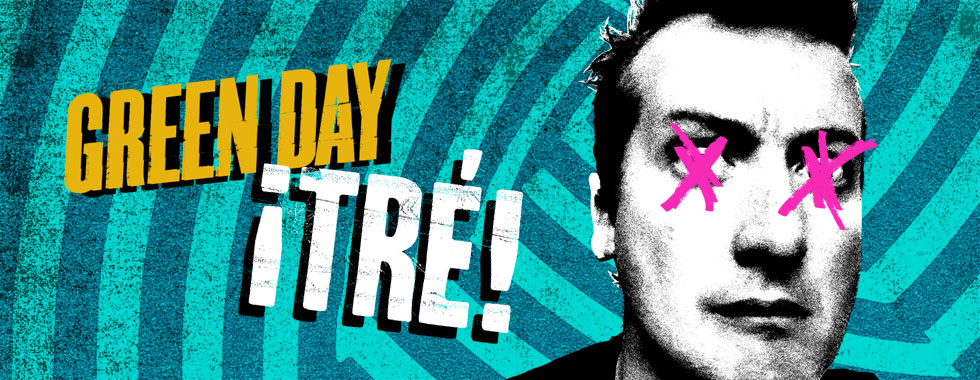Green Day unleashes ‘¡Tré!’: the final installment of 2012 trilogy
On Dec. 11, Green Day released “¡Tré!” to complete their 2012 album trilogy, which includes 37 songs released over a 78-day period. Although most critics did not receive “¡Uno!” and “¡Dos!” well, and these first two albums had an underwhelming number of sales, “¡Tré!” had a much better reception from critics and fans.
With “¡Uno!” having more of a power-punk style and “¡Dos!” being more experimental, “¡Tre!” is more like “American Idiot” and “21st Century Breakdown” in its design to blast through stadiums.
The album opens with the slow and powerful ballad, “Brutal Love.” This track features the vocal diversity Billie Joe Armstrong is truly capable of and even a key change, which is pretty rare for Green Day.
The next track “Missing You” is a catchy, pop-punk style song about being a “complete disaster” from missing someone: “I searched the moon/ I lost my head/ I even looked under the bed.”
Several tracks on “¡Tré!” embrace the pop-punk style and subject matter from Green Day’s grassroots albums, “Kerplunk!” and “1,039/Smoothed Out Slappy Hours,” except with a much cleaner recording. “8th Avenue Serenade” and “Amanda” both feature this style with lyrics about grasping on to love before it fades away.
The rest of the album dabbles in issues of the modern world with a big sound and sing-along melodies meant for stadium shows. The songs “Sex, Drugs and Violence,” “A Little Boy Named Train” and “X-Kid” have an analytical tone of personal reflection, which is a common theme on many of Green Day’s earlier albums, such as “Warning” and “Insomniac.”
Both “Drama Queen” and “Dirty Rotten Bastards” break the pop-punk and stadium-style trend with more experimentation like that on “¡Dos!”
“Drama Queen” has a cutesy, mostly acoustic sound that includes a piano, which gives the song a show tune feel. It is quite an interesting and sarcastic way to accompany lyrics about a wild, reckless “drama queen” who sounds like a Lindsay Lohan or Paris Hilton-like character: “Daddy’s little bundle of joy/ Out of a magazine/ Everyone’s drama queen is old enough to bleed now.”
“Dirty Rotten Bastards” starts off as a bouncy tune with lyrics that, of course, criticizes the modern world. Because of the shift in tempo and rhythm halfway through the song, it is much like “Jesus of Suburbia” and “American Eulogy” in how it sounds more like two songs in one.
The album closes without much fanfare with “The Forgotten,” a piano ballad featured in “Breaking Dawn: Part 2.” The lyrics are pretty simple and cliché, sometimes not even making sense: “Don’t look away from the arms of a bad dream.” This ending to the album is incredibly weak compared to the scale of the rest of the songs, and quite out of character for Green Day.
Although most critics and reviews claim that Green Day’s third installment of the trilogy is more consistent and refined, it is definitely not the most exciting album of the three.
“¡Uno!” serves as a throwback to what fans call “old Green Day,” and the songs have much more of an intense punk style than the songs on “¡Tré!.”
“¡Dos!,” which received the most criticism of the two albums, contained phenomenal experimentation across several different genres without losing Green Day’s punk edge. Of the three albums, “¡Dos!” certainly had the most energy and the most poetic lyrics.
With “American Idiot” and “21st Century Breakdown,” Green Day had found a way to be part of the mainstream without completely committed to it. Though the songs on “¡Tré!” do showcase Green Day’s later style, it sounds much more mainstream than they ever have before, especially in “The Forgotten.”
While “¡Tré!” certainly has some good qualities in its clean execution and readiness for a massive stadium, it feels like an unnecessary apology for Green Day playing around with their style on “¡Uno!” and “¡Dos!.” Though the unique musical style of these first two albums is shocking at first, they certainly have a way of growing on the listener.
“¡Tré!” was a slight disappointment as the closing album of Green Day’s 2012 trilogy, but it was not a complete failure. Overall, Green Day surprised their fans with such a change in style (and flashback to their old style) on these three albums. One can hardly say that this trilogy will bring Green Day any success in drawing in new fans, but they certainly can satisfy Green Day die-hards.
On a side-note, yes: I, Emily Medley, your friendly neighborhood Green Day fan-girl, just criticized a Green Day album. Love is not always blind.

